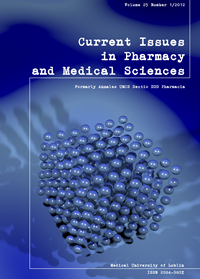Effects of bupropion and mecamylamine on motivational effects of drugs of abuse measured in CPP-reinstatement test in rats
DOI:
https://doi.org/10.12923/j.2084-980X/25.1/a.05Keywords:
nicotine, WIN 55,212-2, ethanol, bupropion, mecamylamine, place conditioningAbstract
In the present study, we investigated the mechanisms of cross-reinstatement of nicotine-induced place conditioning in rats. We used the conditioned place preference (CPP) paradigm and our data revealed that nicotine (0.175 mg/kg, base, i.p.) produced a place preference and once established, nicotine CPP was extinguished. Moreover the CB1 receptor agonist – WIN 55,212-2 (0.5 mg/kg, i.p.) or ethanol (0.5 g/kg, i.p.) reinstated a marked preference. Furthermore, we evaluated and compared the efficacy of the atypical antidepressant drug - bupropion (5, 10 and 20 mg/kg, i.p.) and a nonselective nicotinic receptor antagonist - mecamylamine (1 and 2 mg/kg, s.c.), in blocking the reinstatement of nicotine CPP provoked by WIN 55,212-2 and ethanol. Our results demonstrated that mecamylamine in all used doses and bupropion (except for dose of 10 mg/kg used in reinstatement induced by WIN 55,212-2) attenuated the reinstatement of nicotine-conditioned response induced by both drugs. Results obtained in the present studies may contribute to better understanding of the neurochemical mechanisms underlying nicotine addiction and the reciprocal relationships between nicotine, cannabis and ethanol.
Downloads
Published
Issue
Section
License
Copyright (c) 2025 Barbara Budzyńska, Marta Kruk-Słomka, Piotr Polak, Grażyna Biała (Autor)

This work is licensed under a Creative Commons Attribution-NonCommercial-NoDerivatives 3.0 Unported License.


